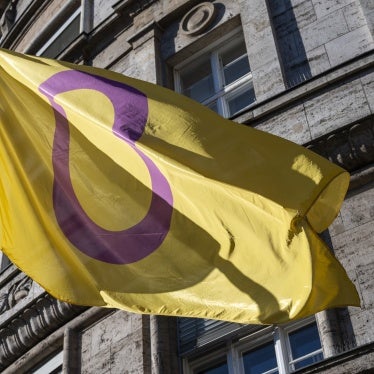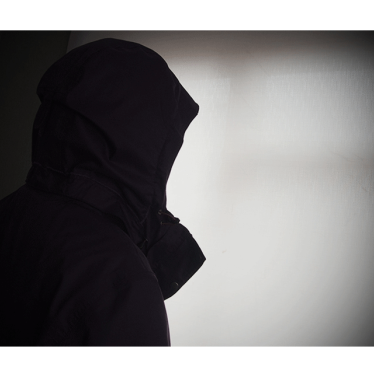Speed skating is the national sport and Dutch people are good at it. This time the Netherlands has a very strong female speed skater, Ireen Wüst, who won three gold and two silver medals in March at the World Championships in the Russian city of Sochi.
While she was winning all these medals, Wüst probably did not realize that the next time she competes in Sochi, at the Winter Olympic Games in 2014, she runs a risk of being detained and deported. When she gave an interview on Dutch TV in January 2011 she talked about her previous relationship with a woman and why she considers it perfectly fine to be with a person she loves, whether a man or a woman.
In Russian terms this interview falls under the scope of a new law and would be considered “promoting bisexuality.” If she were to give such an interview in Sochi, and if a minor would somehow be exposed to it, Wüst runs the risk of being fined or arrested for up to 15 days, and deported from Russia. No more gold medals for her simply because she might want to make use of her human right of freedom of expression.
It is a hot summer day today and difficult to imagine that in half a year’s time the winter Olympic Games will be held under a legal shadow hanging over the snow capped hills of Sochi. Participants and fans alike could be at risk of fines or deportation if they speak out in favor of LGBT rights.
Last month Russia adopted a homophobic, discriminatory law. It bans dissemination among minors of any information “promoting” “non-traditional sexual relationships.” Under the guise of “protecting children” the law crushes freedom of expression by effectively preventing any positive affirmation of lesbian, gay, bisexual, and transgender (LGBT) people.
The new law implies that Russia’s LGBT citizens are unnatural and alien, demonizing LGBT people and activists in the public eye, and possibly making them more vulnerable to harassment and physical attacks.
The law applies not only to Russian citizens, but to anyone who publicly addresses homosexuality in Russia in anything but a negative light. Four Dutch citizens making a documentary about the effects of the law were arrested in the city of Murmansk, while interviewing Russians about homosexuality. The people they interviewed were questioned.
The police report accuses the Dutch journalists of violating the terms of their visa and of violating the “propaganda” law. But you don’t have to be filming for a documentary to get arrested according to the law banning “promotion of non-traditional relationships.”
The Russian law is clearly incompatible with the Olympic Charter’s promotion of “human dignity.” The charter rejects any form of discrimination with regard to a person on grounds of race, religion, politics, gender, or otherwise. The law is also a blatant violation of Russia’s international obligations to guarantee non-discrimination and respect for freedom of expression.
Similar laws banning “homosexual propaganda” among minors have already been adopted in 10 Russian regions, including the Krasnodar region, which includes Sochi.
In addition to these laws, in 2011, Russian authorities refused to register the non-governmental organization Pride House in Sochi, which its founders hoped would work to combat homophobia in sport and promote LGBT rights during the games.
The Sochi Pride House founders contested the denial of registration. In February 2012, the Krasnodar Pervomaisky District Court upheld the denial, stating that the organization would “contradict the foundations of public morality and government policy in the area of protection of the family, motherhood, and childhood.” The organizers appealed to the European Court of Human Rights.
The first Olympic Pride House was created for the 2010 Winter Olympics in Vancouver. It offered information about homophobia in sports and a recreational meeting place for LGBT athletes during the Games. During the 2012 London Summer Olympics, a Pride House functioned on Clapham Common for the duration of the Games. It is deplorable that the Pride House tradition will be cut short in Russia.
Both the pernicious legislation and the refusal by the authorities to register the Olympic Pride House Sochi are forms of discrimination affecting the Olympic movement and sharply at odds with commitments to non-discrimination under the Olympic Charter. They are also incompatible with Russia’s responsibilities to the Olympic movement and the IOC as host of the Games.
An anonymous spokesman was recently quoted in the media saying that the IOC is “concerned” about Russia’s legislation and reiterated the IOC’s “long commitment to non-discrimination against those taking part in the Olympic Games.” And in a statement to the Windy City Times of Chicago acknowledging Russia’s “propaganda laws,” the IOC stated, “The International Olympic Committee is clear that sport is a human right and should be available to all regardless of race, sex or sexual orientation. The games themselves should be open to all, free of discrimination, and that applies to spectators, officials, media, and of course athletes. We would oppose in the strongest terms any move that would jeopardize this principle.”
This is not enough. The IOC should take additional steps to send a clear signal to the Russian authorities that discrimination against people based on their sexual orientation and gender identity is sharply at odds with Russia’s human rights and Olympic commitments.
The IOC should obtain guarantees from the Russian authorities that the homophobic legislation will not be enforced and that the authorities will refrain from any additional discriminatory legislative initiatives or policies that discriminate against lesbians, gays, bisexual, and transgender people. Also, the Russian authorities should state publicly that, as Olympic host, Russia will ensure, without distinction, the safety and the freedom of expression and association of all athletes, coaches, fans, and others who will attend the Sochi Games. The IOC should publicly state its support for LGBT rights and call on Russia as Olympic host to reverse its discriminatory course.
Wüst, the Dutch female speed skater, should not be worried if she wants to speak her mind during the Olympic Winter Games in 2014 about how her love for men or women inspires her to achieve excellency in her sport.








